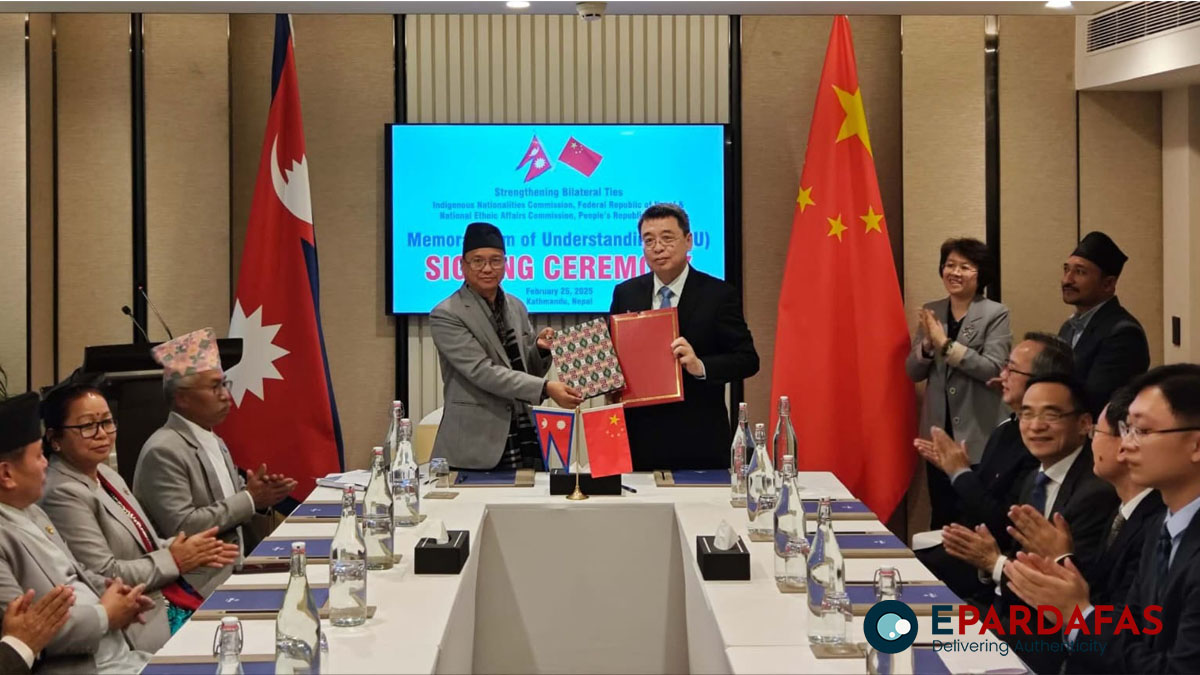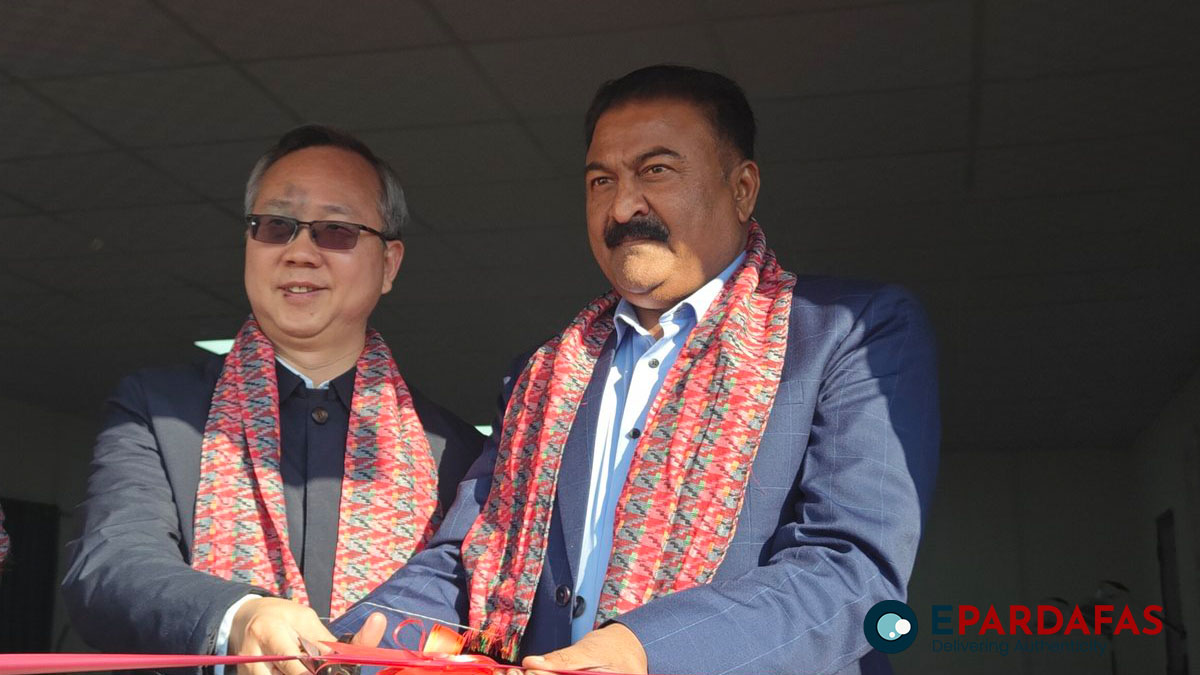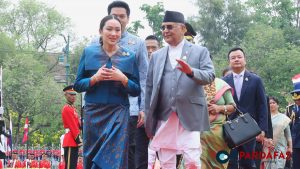
CPN-UML-led Government Bypasses Nepali Congress in Controversial Agreement with China, Raising Concerns Over Transparency, Security and National Interest
In yet another instance of procedural manipulation and political high-handedness, the CPN-UML-led government has bypassed key coalition partners, particularly the Nepali Congress, in pushing forward a sensitive agreement with China. The move has sparked controversy, raising serious concerns about transparency, due process, and the increasing tendency of the UML to make unilateral decisions on critical national matters.
During the cabinet meeting on 12 Falgun, the government approved a 15-point decision, among which the agreement on cooperation in indigenous affairs between Nepal and China was quietly pushed forward without necessary consultations with the relevant ministries. Foreign Minister Arzu Rana Deuba, a senior Nepali Congress leader, was absent due to an official foreign visit, while Law Minister Ajay Kumar Chaurasia was present but seemingly ignored in the process. Instead, Federal Affairs and General Administration Minister Rajkumar Gupta, a UML representative and a member of the House of Representatives from Parsa, took the lead in presenting the proposal. This raises serious questions about the government’s commitment to coalition governance and established diplomatic norms.

The agreement, signed on 13 Falgun by Minister in charge of the National Ethnic Affairs Commission Pan Yue and Nepalese Indigenous Nationalities Commission Chairman Ram Bahadur Thapa Magar, was finalized without any meaningful discussion within the government, including in Foreign, Home or Law Ministries. Chinese Ambassador to Nepal Chen Song was also present at the signing ceremony, which was organized to mark the 70th anniversary of Nepal-China diplomatic relations.
The manner in which this agreement was rushed through, without the knowledge or approval of the Foreign, Home and Law Ministries, highlights a growing pattern of authoritarian decision-making within the UML leadership which has reduced Nepali Congress virtually to be its B-team.
The eight-article agreement, framed under the guise of strengthening ties in ethnic governance and cultural exchanges, contains several vague and ambiguous clauses that warrant closer scrutiny. The first article establishes that the agreement serves the “sustainable development of the China-Nepal strategic cooperative partnership,” a phrase that aligns closely with China’s broader geopolitical strategy but remains ill-defined in terms of Nepal’s specific interests. The agreement emphasizes “building a community with a shared future for mankind,” a phrase frequently used in China’s global diplomacy, raising concerns that Nepal may be inadvertently aligning with China’s strategic objectives without a clear assessment of the long-term consequences.
The second article of the agreement proposes strengthening inter-departmental exchanges and cooperation, focusing on sharing experiences in the governance of ethnic affairs. However, there is little clarity on how Nepal will ensure that such cooperation remains free from political or ideological influence, especially after experiencing recent ethnic disturbances in Koshi Province. Furthermore, the agreement promotes cultural, youth, and tourism exchanges, stating that both sides will invite each other to participate in international conferences and forums related to ethnic affairs. Yet, the document lacks specifics on funding sources and implementation mechanisms, making it unclear how Nepal will finance its participation and whether there are hidden obligations involved.

Another concerning aspect is the financial arrangement outlined in the agreement. While Article 5 states that any financial commitments will be decided on a case-by-case basis, this approach lacks transparency and leaves room for discretionary, opaque financial dealings. Given Nepal’s past experiences with foreign agreements that have resulted in long-term financial dependencies, such vague terms should have warranted a thorough review by the Law and Foreign Ministries. However, by bypassing these ministries, the UML-led government has effectively shielded the agreement from critical legal and diplomatic scrutiny.
The agreement also raises sovereignty concerns in the event of disputes. Article 7 states that any disagreements regarding the interpretation or implementation of the agreement will be resolved amicably through bilateral negotiations. While this may seem like a standard diplomatic clause, it effectively excludes international oversight, giving China significant leverage in case of disagreements. The agreement will remain in force for five years, with either party able to terminate it by giving three months’ written notice. However, the fact that the agreement was pushed through without debate within the government makes it unclear whether Nepal even retains the institutional capacity to assess its long-term implications.
The manner in which this agreement was signed without consulting key stakeholders is indicative of a larger problem within the UML-led government—its growing disregard for coalition partners and the erosion of democratic decision-making. Senior Nepali Congress leader Shekhar Koirala has repeatedly warned that UML is systematically sidelining Congress in governance, and this incident only strengthens his argument. It demonstrates that the UML is treating the Congress as a mere bystander rather than an equal partner in the ruling coalition.
Nepal’s foreign policy has traditionally been rooted in cautious diplomacy and balanced engagement with its immediate neighbors and global partners. However, the UML’s approach of making unilateral decisions on critical issues threatens to disrupt this balance. This is not the first time the UML has faced accusations of undermining coalition politics and disregarding institutional procedures. The party has a history of consolidating power through political maneuvering, and this latest incident only adds to the growing list of concerns about its governance style.
At a time when Nepal is navigating complex regional dynamics, agreements with major powers should be handled with utmost transparency and a bipartisan approach. Foreign policy decisions, especially those with long-term strategic implications, require careful deliberation, inter-ministerial coordination, and parliamentary scrutiny. By sidelining the Foreign and Law Ministries in an agreement with China, the UML-led government has once again shown its willingness to bypass democratic processes for political convenience.
The question now is whether the Nepali Congress will take a firm stand against this blatant disregard for coalition governance or allow itself to be further marginalized by UML’s unilateral decision-making. The incident serves as a wake-up call not only for Congress but for all political forces in Nepal that are committed to transparent governance, national sovereignty, and responsible diplomacy. If such procedural bypassing continues unchecked, it could set a dangerous precedent for future governance and Nepal’s foreign policy direction.













Comments